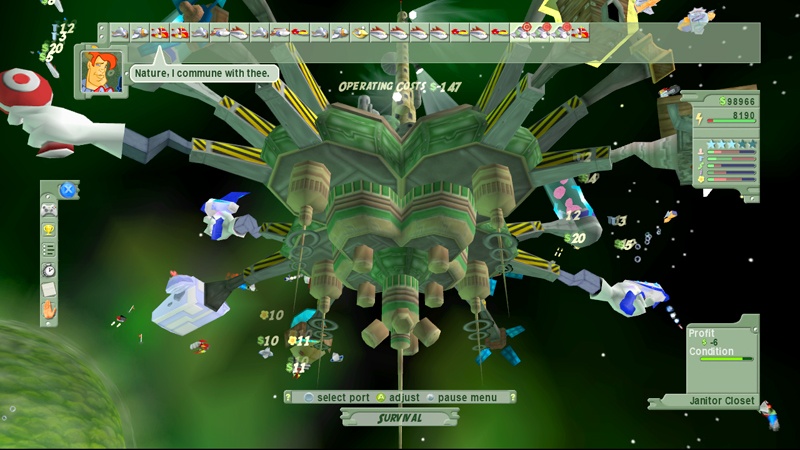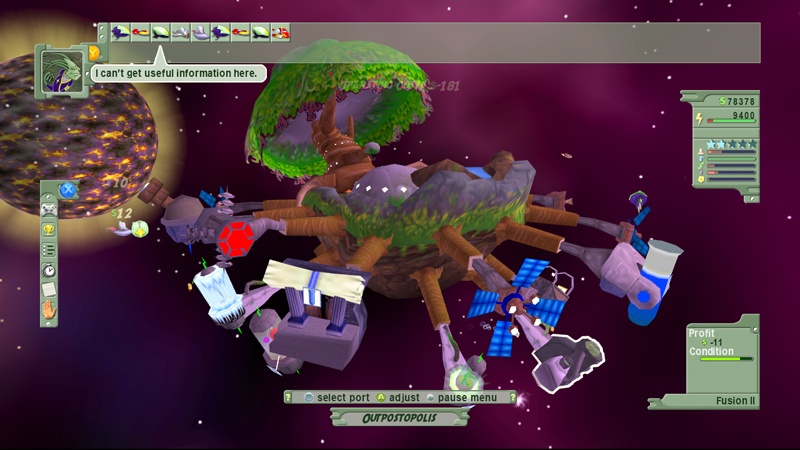One of the most unlikely Xbox Live Arcade games to launch alongside the Xbox 360 is Outpost Kaloki X, a lighthearted strategy game in which you're in charge of running a space station serving all kinds of intergalactic denizens and their weird needs. Similar to other tycoon-style games, Outpost Kaloki X is really a game about maximizing cash flow as you outfit your outpost with sci-fi lemonade stands, video arcades, singles bars, and other stranger diversions, all while making sure everything's in a proper state of repair and has sufficient energy to keep going. Decent 3D graphics and a breezy soundtrack accentuate the game's tone, and there are plenty of different scenarios to keep you coming back, though the underlying gameplay gets to be pretty predictable after a while.

In a given mission, you see your outpost in the center of the screen, and may rotate it around or zoom in and out to get a different look. Your view automatically snaps to the different nodes on your outpost, which is where you can build expansion bays. Basically, your outpost is a shopping mall, and the nodes are your store fronts. You have a limited number of nodes to work with, so you have to decide on the most lucrative types of expansions to stick in them. This decision tends to be relatively easy in a given scenario, because you have a real-time demand chart showing you what types of diversions your customers want most at the moment. What's more challenging is budgeting your time and money. If you quickly splurge on a bunch of new expansions, you might find yourself in a financial rut as everything slips into a state of disrepair. And since you have a limited amount of time in which to complete most scenarios, you have to be careful to not set yourself back too far by inadvertently grinding business to a halt through some hasty decisions. It's generally not all that difficult in practice, and the "adventure story" mode does a good job of holding your hand through some very basic scenarios to get you acclimated with how the game works. But some of the later scenarios really force you to be careful, and manage subtler aspects of your business, like overall customer satisfaction and so on.
In addition to the adventure story, which is a sequence of progressively tougher scenarios tied together by a few fairly amusing plot points, there's a more challenging, military-themed "war story" campaign that consists of roughly the same types of activities. One minor issue is that both of these modes force you to check your mission objectives as soon as you take on a new assignment, since your objectives aren't made clear in the context of the story. There are other stand-alone scenarios on top of that, including sandbox modes that let you see just how bustling of a space station you can create without having to worry about time running out or specific mission objectives. So there's quite a bit of content overall, though the action nevertheless starts to get pretty repetitive, especially since you'll be unlocking the same types of expansion bays each time. You typically end up with lots more options than you have nodes to support, so you'll find yourself building an expansion to unlock the next-best version, then selling that expansion back right away so you can build the better one, and so on. Also, while you'll start to see space traffic start pouring into your increasingly bustling station--and you can even follow individual spaceships around--there's really not much interaction with your customers, apart from homing in on them to get a sense of how their personal needs compare to the bigger picture.

Despite the simplicity of the game's structure, the underlying action is pretty satisfying, especially because there's a natural feel to it. You don't just have a rigid cash flow; as upkeep costs for your expansions kick in and as people (things?) come and go, the rate at which you earn money changes quite a bit, which helps keep you from going into cruise control, just watching the revenue pile in. And if you need to save up for a big purchase, you can adjust the game speed at the touch of a button, so you never really have to just sit around waiting for something to happen. Also, because mission objectives and customer needs are different from one scenario to the next, it's fun to press through each successive scenario, if only to see the next one. And while the story tidbits are kept to a minimum, they do help tie everything together. The game's interface works well, though it may look a little small onscreen by default. Fortunately, you have the option to adjust the size of the key icons that appear onscreen.
Outpost Kaloki X doesn't offer much in the way of fancy graphics and sound, but the smooth, colorful 3D visuals and the jazzy soundtrack suit the game well. In addition to all the different scenarios (and the promise of more downloadable content coming later), the game offers high-score leaderboards as well as a dozen unlockable achievements, which help give you incentive to press your way through all the missions and modes. For about $10, all this is a good value, and represents a nice way to break from all the fast action of the Xbox 360's main library and put on that thinking cap again, for a change.